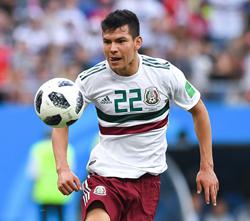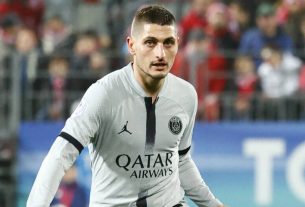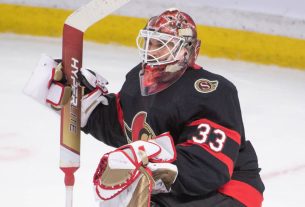As the 2018 World Cup approaches the knockout round, youngsters with the potential to make headlines during and after the event abound.
The FIFA World Cup is the ultimate career-defining moment for any soccer player looking to make a name for himself. It is the stage where either legends are made or go down in history for not stepping up to the occasion.
Names such as Mario Gotze, James Rodriguez and even a certain Pelé became recognized after massive World Cup campaigns.
The 2018 World Cup is full of youngsters with the potential to make headlines during and after the event.
But who are they?
HIRVING LOZANO (MEXICO)
Just 22 years of age, Hirving Lozano joined the youth club of Pachuca at age 14. He starred for the club over the course of five seasons at the youth level and joined the parent club in 2014.
Growing up, Lozano earned the nickname of “Chucky” after the doll in the popular American horror movies series due to his Lozano’s affinity, as a young player, for hiding and scaring teammates as a young player.
Lozano has been making waves in Europe ever since his move from Mexican club Pachuca to PSV Eindhoven. Lozano became the first player in history to score in seven of his first eight Eredivisie games, scoring 10 goals in his first 11 games. Ronaldo, Romario and Ruud van Nistelrooy don’t even come close to these numbers while playing in the same league. The winger has scored four goals for Mexico in World Cup qualifiers.
LEON GORETZKA (GERMANY)

In his youth career, Leon Goretzka represented his hometown team of Bochum from the age of 6 all the way until his pro debut. At one point during his tenure with the club, the German midfielder was dubbed “Germany’s biggest talent in 50 years,” by his then-coach Peter Neururer.
As articulated in Stephan Userfeld’s profile on Goretzka for ESPN.com, Goretzka still holds a soft spot and seasons tickets for the Bochum club, which sits in the shadow of the German soccer giants Dortmund and Schalke. In 2013 Goretzka made the move to Schalke after Bochum was relegated to Germany’s tier-2 league.
The move served as a springboard for the young player, and Goretzka signed with Bayern Munich this past January.
Leading a team as stacked as Germany in scoring is no easy feat, but that’s precisely what Goretzka did in 2017, scoring three goals in World Cup qualifiers. The young midfielder showed his talent at the FIFA Confederations Cup, also scoring three goals and playing brilliantly on his road to lifting the trophy.
MARCO ASENSIO (SPAIN)

Born to a Dutch mother and Spanish father in Palma, Majorca, Spain, Marco Asensio was destined for soccer stardom from birth. His mother named him after Marco Van Basten, a famous Netherlands Soccer icon. Asension was 9 when his mother declared to the president of Real Madrid that young Marco would one day play for the team. Her words would eventually ring true, but the road wasn’t easy.
During his youth play, Asensio was forced to endure a developmental condition that caused joints in his legs to flare up every time he would take the field. Though it was a condition doctors said he would grow out of, it resulted in significant pain that hindered Asensio’s recovery between matches. Even more pain surfaced for Asensio after his mother passed away from terminal cancer when he was 15.
Yet the obstacles did not phase Spain’s young phenome, who eventually realized he and his mother’s dream by signing a contract with Real Madrid in 2016. Today, every goal Asensio scores is dedicated to his late mother.
Asensio’s meteoric rise to fame shows he is destined for great things on the world stage. The young Spaniard started really making headlines after a standout season with Real Madrid and beginning his 2017-2018 campaign with a contender for goal of the season against no other than rivals FC Barcelona. Marco has also proven himself for his national team, scoring a hat trick against Macedonia during the EUFA Euro U-21.
https://www.youtube.com/watch?v=ZKjZy6-Ofko
PAULO DYBALA (ARGENTINA)

Paulo Dybala was first gifted a soccer ball at age 2 and showed adequate talent for the game. It was not a foregone conclusion, however, that he would ascend to the world-renowned club of Juventus or play for the Argentinian national squad.
As articulated by Dybala’s former coach, Pablo Alvarez, “In the youth teams, no. I’ve seen better players who never made a career for themselves.”
Yet it was Dybala’s focus and bond with his father that made the difference in his career. In an effort to aid his son’s development, Dybala’s father Adolfo drove Paulo roughly 70 kilometers to training sessions at the Instituto de Cordoba, filling the rides with words of encouragement and lessons. Tragically, Adolfo passed away when Paulo was 14.
Though his father’s passing weighed heavily on Dybala in the subsequent year, he stayed true to his father’s wishes and stayed motivated and focused on the game of soccer.
After being switched from a center midfielder to forward at the age of 17, Dybala’s career took off. In his second appearance for Instituto’s parent club, Dybala became the youngest player to ever score for the club. The following season he received a transfer from Palermo in Italy, and he subsequently joined Juventus, Italy’s biggest club, in 2015.
Dybala has already tallied 24 goals in 46 appearances this season and is showing no signs of slowing down for the World Cup. The Argentinian went on a scoring streak of eight goals in five league games, Messi-like figures that have brought on Messi-like comparisons. Their dribbling, passing, movement and technique are very similar, and Dybala could become that new hero Argentina desperately needs.
GABRIEL JESUS (BRAZIL)

A proven player for Manchester City, Gabriel Jesus emerged from humble beginnings. Born in São Paulo, Brazil, Jesus grew up in in the impoverished favelas (slums) outside of the city. He learned to play soccer on a dirt pitch located inside the grounds of a military prison. Training at the pitch, which was open on Saturdays for players between the ages of seven and 14, was as much about soccer as it was about food. The reason many players showed up was so they could eat that day, and the club provided Jesus with food to bring back to his family after training.
After he first showed up as an 8 year old, it was clear to the coaches that Jesus had a knack for the game and the drive to improve.
“[Jesus] was always first in line for exercises and drills – he wasn’t one of those who loitered at the back pretending to do the drill, like so many are,” said José Francisco Mamede, a former coach to Jesus.
Jesus’ dedication landed him a spot on the Brazilian squad of Palmeiras, and eventually Manchester City, but the forward has not forgotten his roots. As a player for Palmeiras, Jesus routinely returned to his first pitch to play pickup games with younger players. The crafty forward even donated cleats to the club’s cause, stating in a Guardian article by Nick Ellerby, “I’m the same as them. I’ve also had my problems. I think it’s really important for them to hold on to the dream they may one day realize.”
Entering the World Cup, Jesus is precisely the kind of trademark Brazil forward his country has been waiting for. The 20-year-old can play anywhere in the attack and combines world-class finishing with dribbling, good pace and technical ability. Jesus scored five goals and provided three assists in just eight games for Brazil during its World Cup qualifiers.



